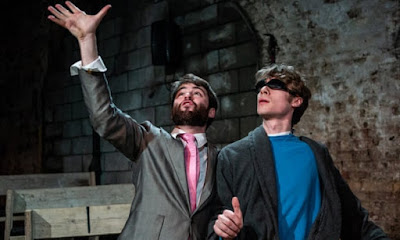The Good Landlord/The Shy Manifesto, Words as/of Remembrance
The Good Landlord, The Shy Manifesto - Michael Ross
February 2019
Written for The Guardian
The news last month that the playwright Michael Ross had died of cancer aged 40 came on the eve of two productions that represented a breakthrough for him. His play The Shy Manifesto has embarked on a UK tour, while The Good Landlord opened at London’s Vault festival.
February 2019
Written for The Guardian
The news last month that the playwright Michael Ross had died of cancer aged 40 came on the eve of two productions that represented a breakthrough for him. His play The Shy Manifesto has embarked on a UK tour, while The Good Landlord opened at London’s Vault festival.
Ross had been writing plays for more than 10 years and both new ones reveal a witty dramatist with a particular interest in the alienating impact of technology. Some of the ideas are a bit fuzzy, but the writing is a gift to actors: light and energetic, lacking in pretension and full of compassion.
The Shy Manifesto (★★★☆☆) feels the more personal of the two plays – a one-man show about a timid teenager, Callum, who longs to write. Theo Ancient (fresh from playing Albus Potter in Harry Potter and the Cursed Child) performs with earnest application, a nervous grin etched on his face and his eyes opened so wide they begin to water.
Callum’s speeches occasionally sound a little strained: they’re peppered with old fashioned idioms and elevated vocabulary, which land awkwardly on the teenager’s tongue. But the other characters in his life, played by Ancient with boundless energy, make a strong impression. Aunty Libby tries to cajole Callum out of his shyness and is all pursed lips and mumbled warnings; fellow student Tyrone is openly gay and gloriously camp; Callum’s mother and father frequently pop up at the dinner table, one anxious, the other stern and both boxing Callum in with their niggling asides.
There are moments when the energy sags, despite Cat Robey’s efficient direction and Charlotte Henery’s inventive set, which slowly fills with the detritus from a truly calamitous house party. Ross reaches for a conclusion – live your best shy life – that isn’t embedded in the play, but some scenes really sting, particularly when Callum muses about a future in which he might communicate with the world “entirely through my writing”.
The Good Landlord (★★★☆☆) has similar highs and lows: sparky dialogue, vibrant characters, and some promising ideas that don’t quite reach fruition. We’re in the heart of London, where graduates Tom and Ed have found – shock! – an affordable flat right by Big Ben. But there’s a hitch: the landlord has installed cameras throughout the building. The estate agent (Phoebe Batteson-Brown, suitably shrill) insists they are for security. Ed is convinced. Tom is concerned.
Robey directs again, with precision, and makes nifty use of Nima Chatrizeh’s sound design to gradually accelerate a feeling of unease. But the purpose of Ross’s play feels unclear. The Good Landlord is, in part, a satire about the dehumanising impact of the housing crisis, as well as the disturbing encroachment of surveillance. But there are a number of unlikely plot twists and confusing character volte-faces, which end up blurring the playwright’s intent.
Still, the actors thrive. Maximillian Davey plays Tom as a bumbling and likable straight man, driven to the streets to avoid the landlord’s gaze. Rupert Sadler, as the acquiescent Ed, stalks the stage with his eyes raised permanently upwards, pleading with the landlord who lurks above. Sadler simpers and flatters, strips and flirts, willing to do anything it takes to keep his flat. It’s a brilliant comic turn with dark undertones as we watch a man lose himself without a second’s thought as to what he might be giving up, to get ahead.



Comments
Post a Comment